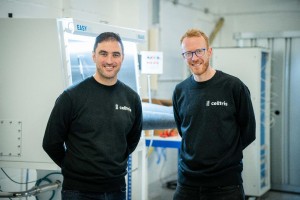A pioneering Bristol-based start-up Celltris has received a second round of funding as it accelerates its mission to develop more effective, cheaper electric vehicle batteries.
The £800,000 combined equity and grant investment means the firm has now raised more than £1.3m to launch a battery development and cell prototyping centre in Bristol. 
The team at Celltris, led by founders Sam Alexander and Ian Hunt, pictured, have more than two decades’ experience developing lithium-ion batteries.
Having both worked at battery manufacturer Britishvolt and on battery research at innovative household appliance firm Dyson – they launched the business to reinvent how battery cells can be assembled to eliminate wasted internal space, taking advantage of modern manufacturing methods to unlock the next generation of prismatic cell design.
By leveraging these new methods, Celltris hopes to significantly increase the energy density and reduce the cost – with a smaller manufacturing footprint than that used today.
Celltris CEO Ian Hunt, who was previously head of cell design at Britishvolt, said: “This raise helps us to cement our position as a leading cell design business.
“It will significantly speed up the development of our go to market offering and allow us to purchase the equipment required to complete a cell prototyping facility in Bristol.”
The latest funding round was led by QantX , the South West-focused venture capital firm investing in globally impactful innovations across sectors improving outcomes in health and sustainability, in partnership with UKRI’s Faraday Battery Challenge, delivered by Innovate UK.
QantX CEO Richard Haycock added: “The critical scale of energy storage demand is such that even small reductions in cell volume can have outsized impact on cost for manufacturers.
“Celltris is a strong and knowledgeable team and we’re delighted to support them in partnership with Innovate UK as they develop the next generation of cells.”
Celltris aims to have its first prototypes, which harness its cell assembly techniques and welding processes, ready by next month.
They will be produced in its own prototyping facility in its Bristol development centre.
The firm is also looking to collaborate from an early stage with customers to integrate their technology into its cell design platform via designs, process models and prototyping.






























